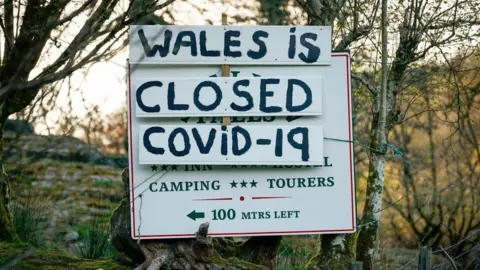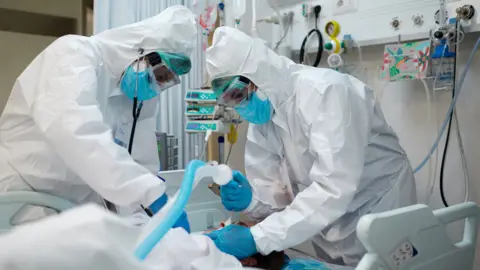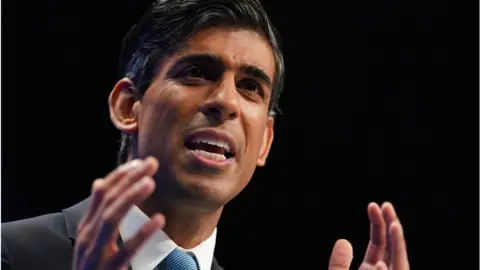Omicron: Does Wales have its own Covid Plan B?
 Getty Images
Getty ImagesPrime Minister Boris Johnson has announced that England will be heading into what's become known as the "Plan B" set of restrictions.
Its in response to the emergence of Omicron, with officials increasingly concerned at the variant's transmissibility and pressure it could put on the NHS.
In Wales, the devolved government has a set of regulations that look very much like Mr Johnson's announcement for England.
People are already asked to work from home, and Covid passes are required in more venues than in England. Mask wearing has remained mandatory in many indoor public places, barring pubs and restaurants.
Yet case rates have remained high - with seven day rates not fallen below 470 per 100,000 for months.
Boosters are being rolled out to more people, but should officials want to slow the spread while more arms are being jabbed, there is a plan they could implement.
It involves a return to the restrictions on our social lives and on businesses that were axed in summer.
Ministers, before Omicron, were at pains to stress they did not think a lockdown would be necessary again.
Now, the picture is unclear.
Welsh ministers have never ruled out needing to return to restrictions on businesses and our social lives, but have played down the chance of a new lockdown in the past.
But ministers in Cardiff face potentially difficult choices if the decisions they want to take are different to those being considered in London, and the money to support Welsh restrictions does not emerge.
 Getty Images
Getty ImagesWhat are Wales' Covid restrictions now?
Wales, in common with the rest of the UK, currently has no restrictions on social contact and all businesses are allowed to open.
But mask wearing is the law in indoor public spaces, including shops, public transport, hospitals and social care settings. The exception is in pubs, restaurants and nightclubs.
The UK government had scrapped mask rules in England during the summer, but re-introduced them after Omicron emerged.
People in Wales are also legally required to obtain a NHS Covid pass if they are going to large events, a nightclub or a venue that's similar to a nightclub.
The law goes further than the requirement in England, with passes also now needed to go to cinemas, theatres and concert halls.
The pass needs to show if an individual has had a recent negative lateral flow test in the last 48 hours, or two vaccinations.
And it is not a legal restriction, but individuals are advised to work from home if they can.
 Welsh government
Welsh governmentCould there be Christmas restrictions?
While there are no plans, the picture has become uncertain.
Ministers had hoped expanding the NHS Covid pass system would avoid the need to take more drastic action.
But in recent days Welsh ministers have not been able to say what restrictions will be in place during the festive period.
They have instead emphasised people should take precautions - like taking a lateral flow test before meeting relatives.
First Minister Mark Drakeford has previously said he has no plans to shut businesses.
But he had also written a letter to the prime minister asking for financial support if he needed to implement "more interventionist measures".
He said the point of the letter was to make it clear to the UK government it they "can't do what they did last year", referring to a row when the Welsh government decided to go into a firebreak lockdown in October 2020 but furlough was not extended in response.
What is the plan? What are Wales' alert levels?
Under the latest Covid control plan, Wales is currently classed as being "Covid Stable", where there are very few restrictions.
But the Welsh government could move to "Covid Urgent", drawn up if new and unexpected Covid pressures emerge - like a new variant that does not respond to vaccines, or if there is unsustainable pressure on the NHS.
In that scenario, the Welsh government plans to return to the alert level lists of restrictions it had in place last year - stretching from restrictions on socialising to a Welsh lockdown.
Ministers have given no clues what alert level they may choose in response to Omicron, or even if they will move to Covid urgent.
The lightest set of restrictions, classed as alert level one, would see the rule of six on social contact indoors, and nightclubs closed.
At alert level two, meetings with people outside your extended household in a private home would be effectively banned, and ice rinks shut.
In alert level three, more venues would be forced to close, and pubs and restaurants would only be able to serve outside, and outdoor gatherings limited to six.
Finally, alert level four would reintroduce a stay-at-home lockdown like that seen in January.
But the rules are not set in stone. Laws on coronavirus in Wales have changed rapidly as the pandemic and they could be changed again.
What did Wales do during Christmas 2020?
The Alpha variant contributed to large Covid wave at the end of last year, overwhelming hospital services. Wales was badly hit.
Cinemas and other indoor entertainment venues were closed at the start of December, and alcohol was banned from sale in pubs, restaurants and cafes.
But the situation saw Labour ministers go further.
The country went into lockdown on 23 December, and plans to allow social contact indoors over the Christmas break were limited to just Christmas Day.
 Getty Images
Getty ImagesCould Wales go into lockdown alone?
Moving to Covid Urgent, combined with a ramping up of restrictions on businesses, poses real dilemmas for a devolved government that cannot summon large pots of cash.
A long Welsh lockdown without the help the Welsh government has asked for from the UK government could leave thousands out of work and facing significant financial hardship.
While the individual UK nations have pursued sometimes different lockdown policies, they did it with financial firepower from Westminster in the background - including the furlough scheme.
Furlough ended on 30 September and as things stand there are no plans to bring it back.
Should a situation develop where pressure on the NHS in Wales was acute, but furlough did not return, the stakes in a Wales-only lockdown where businesses shut would be high for Mark Drakeford.
But if the situation is bad in Wales, it may be the same in England, where Boris Johnson's government will face similar pressures.

- MONUMENTAL MRS CAMPBELL: Wales' first black head teacher celebrated with iconic statue
- MOTHERS, MISSILES AND THE AMERICAN PRESIDENT: The story of Greenham told like never before

